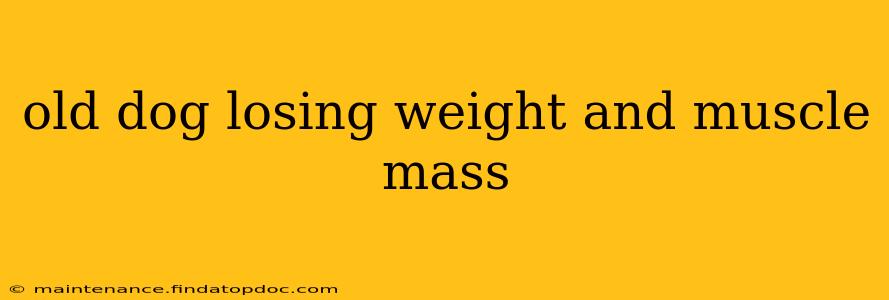Many senior dog owners face the heartbreaking reality of their beloved companions experiencing weight loss and muscle loss, a condition often referred to as sarcopenia. This isn't just about looking thinner; it signals underlying health issues that require attention. Understanding the causes, recognizing the signs, and implementing appropriate strategies can significantly improve your senior dog's quality of life.
What Causes Weight Loss and Muscle Loss in Older Dogs?
Several factors contribute to weight loss and muscle loss (sarcopenia) in older dogs. These often intertwine, making diagnosis and treatment crucial.
-
Age-Related Changes: Just like humans, dogs experience natural age-related decline in muscle mass and function. Their bodies become less efficient at building and maintaining muscle tissue.
-
Dental Problems: Tooth decay, gum disease, and missing teeth can make it painful and difficult for older dogs to eat properly, leading to weight loss.
-
Underlying Medical Conditions: Numerous diseases can contribute to weight loss and muscle wasting. These include:
- Cancer: Cancer cells consume nutrients, leading to weight loss and muscle atrophy.
- Kidney Disease: Kidney failure can affect appetite and nutrient absorption.
- Diabetes: Uncontrolled diabetes can cause significant weight loss.
- Hyperthyroidism: An overactive thyroid can accelerate metabolism, leading to weight loss.
- Inflammatory Bowel Disease (IBD): IBD can interfere with nutrient absorption and lead to weight loss.
- Heart Disease: Heart disease can reduce the body's ability to deliver nutrients to tissues.
-
Poor Diet: An inadequate diet lacking essential nutrients can contribute to muscle loss. As dogs age, their nutritional needs change, and they may require specialized senior dog food.
-
Lack of Exercise: While senior dogs may require less strenuous exercise, a complete lack of physical activity can accelerate muscle loss. Gentle, regular movement is vital.
-
Pain: Chronic pain from arthritis or other conditions can reduce activity levels, leading to muscle atrophy and weight loss.
How Can I Tell if My Old Dog is Losing Muscle Mass?
Recognizing the signs of muscle loss in your senior dog is crucial for early intervention. Look for:
- Visible Weight Loss: Noticeable thinning, especially around the ribs, hips, and spine.
- Muscle Atrophy: Loss of muscle definition, making the muscles appear smaller and less prominent.
- Weakness: Difficulty getting up, climbing stairs, or jumping.
- Lethargy: Reduced energy levels and decreased interest in activities.
- Changes in Appetite: Reduced food intake or changes in eating habits.
- Changes in Coat: A dull, dry, or thinning coat can indicate underlying health problems.
What Should I Do if My Old Dog is Losing Weight and Muscle Mass?
If you suspect your senior dog is losing weight and muscle mass, it's essential to consult your veterinarian immediately. They can conduct a thorough examination, run diagnostic tests (blood work, urinalysis, x-rays), and identify any underlying medical conditions.
What are some common tests to diagnose weight loss and muscle loss in senior dogs?
Your veterinarian will likely perform a physical examination and recommend various tests depending on the suspected causes. Common tests include:
- Complete Blood Count (CBC): Checks for infections, anemia, and other blood disorders.
- Blood Chemistry Profile: Evaluates organ function, including the kidneys, liver, and pancreas.
- Urinalysis: Assesses kidney function and detects urinary tract infections.
- Thyroid hormone levels: To rule out hyperthyroidism.
- X-rays: To identify bone problems, tumors, or other abnormalities.
What treatment options are available for my old dog's weight loss and muscle mass?
Treatment will depend on the underlying cause. Options may include:
- Medication: To manage underlying conditions like diabetes, kidney disease, or pain.
- Nutritional Support: A specialized senior dog diet formulated to meet their changing nutritional needs. This may include supplements to improve muscle mass and overall health.
- Physical Therapy: Gentle exercises and range-of-motion exercises to maintain muscle strength and function.
- Pain Management: Medications or other therapies to relieve pain and increase activity levels.
Addressing weight loss and muscle loss in senior dogs requires a proactive and comprehensive approach. Early intervention and close collaboration with your veterinarian are vital to improving your dog's comfort, well-being, and quality of life. Remember, your dog relies on you to advocate for their health.
